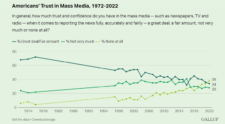Slate Magazine amplifies porn-industry-connected disinformation without even acknowledging glaring conflicts of interest in its sole professional informant
According to Gallup polling, Americans are near a record low in trust in mainstream media—with only 7% of people in recent polls indicating a “great deal” of trust and confidence in the media (and 27% “a fair amount”)—compared with 66% of U.S. adults who say they either “do not have very much confidence” or have “none at all” in newspapers, TV and radio.
How and why is the media’s credibility evaporating? Perhaps because, much like growing skepticism of popular scientific pronouncements, the general public senses that something else is taking place—something more than objective, fair-minded inquiry.
There’s no better case study to illustrate this deeply disturbing phenomenon than a recent article from Slate Magazine by Will McCurdy—targeting one organization’s efforts to help people who are struggling to find freedom from compulsive pornography use.
Stuffing the telephone booth
Few subjects are more in need of clear-headed, accurate, sensitive reporting than the impact of pornography on young adults today. Instead of taking on this important task, McCurdy and his single professional informant tag-team to further confuse public conversation about a critically important issue.
 In post-World War II years, a short-lived fad of attempting to stuff as many people as possible in phone booths spread to South Africa, Britain, Canada, and the United States. Twenty-five students set a world record by squeezing themselves into a single phone booth on March 20, 1959, at the Durban, South Africa YMCA.
In post-World War II years, a short-lived fad of attempting to stuff as many people as possible in phone booths spread to South Africa, Britain, Canada, and the United States. Twenty-five students set a world record by squeezing themselves into a single phone booth on March 20, 1959, at the Durban, South Africa YMCA.
In this tradition, on July 9, 2023, writer Will McCurdy managed to fit a remarkable number of shocking, plainly fallacious assertions into a single 2,000-word article. Discovering even a single error in an article would be of great embarrassment to most journalists—and the outlet publishing their work—but this article alone has five substantial misrepresentations of the relevant research—errors that would be considered significant by most scholars in the field.
Yet this steaming helping of disinformation is not even the biggest red flag here in terms of journalistic integrity. The more remarkable fact is that McCurdy’s sole informant for the article was the defendant in multiple defamation lawsuits involving the very organization she now maligns in McCurdy’s piece—an irrefutable bias not even mentioned in the article.
Some additional background
While mainstream media outlets once generally covered the pornography addiction issue accurately or at least in a balanced manner (for example, this 2016 story in TIME Magazine), the pornography industry disinformation apparatus has since spread numerous hit pieces to lesser journalistic outlets, with such articles often featuring Nicole Prause, David Ley, and other close allies of the industry. This pattern has gained momentum over the years. These days, articles about the science of pornography typically feature associates of the pornography industry, without disclosing their documented bias.
In this case, the McCurdy Slate article further neglects to mention its primary informant’s long history of unethical conduct targeting dozens of researchers, writers, people in recovery, anti-sexual exploitation activists, and pornography recovery experts, including Your Brain on Porn founder Gary Wilson, her pattern of filing false reports against other academics, bankruptcy that obstructed three defamation cases then-pending against her, legal losses, and extensive coziness with the pornography industry.
In short, it’s hard to imagine more glaring conflicts of interest, which makes the Slate decision to publish McCurdy’s piece of potentially enormous public and legal consequence (compounded by the fact that according to NoFap, they were never even contacted by Slate.com for comment or a chance to correct the misinformation).
Without further ado, here is the short list of the most significant fabrications:
False Claim #1. NoFap is moralistically fixated on masturbation
This first one may seem a small point, but figures prominently in the industry’s recurring mischaracterization of the NoFap website. The article-framing sends a very loud message that masturbation is at the heart of this support community—minimizing its actual focus on online pornography overuse. However, NoFap is clearly not an anti-masturbation group. According to its homepage and About page, it exists to foster an inclusive and safe environment for people to recover from “porn addiction and other forms of compulsive sexual behavior.” The site doesn’t even take an anti-porn stance, focusing solely on recovery.
This is a thinly veiled attempt to tie NoFap to something with less public consensus than problematic pornography use, as well as aligning with the article’s determination to portray the organization as somehow cut from the same cloth as conservative religious groups. McCurdy himself asserts a “strong moralistic vibe associated with NoFap,” paraphrases Prause speaking of NoFap’s “quasi-religious demonization of masturbation,” and quotes someone sharing his “feeling” that “the whole organization is based around the sense of purity” and his feeling that they are “just as moralistic” as the church.
As a matter of fact, NoFap is known for its primarily secular usership, who pursue reduced porn use for personal reasons such as improving their relationships, improving sexual function, and living life to the fullest.
In a related vein, the article attempts to tarnish NoFap by implying that it is somehow unfriendly to LGBT people, despite the website being plainly inclusive, forbidding hate speech or other discriminatory content on its forums, and hosting resources specifically for LGBT people.
False Claim #2. A majority of NoFap users are shame-burdened and suicidal
Without any critical examination, the author cites a dubious study conducted by the same biased professional whom NoFap sued over her defamation a few years ago. This professional now asserts that “68.9 percent of participants in a recent study on users of the NoFap subreddit said they felt suicidal following their most recent relapse.” This is presented as evidence that the organization tends to “breed much bigger problems.” While her purported “research” is highly suspect (to say the least), even assuming for the sake of argument that what she asserts is true, it would be just as likely (even more likely) that suicidal feelings are an indication of just how serious are the sufferings of those struggling with porn-related Compulsive Sexual Behaviour Disorder, a disorder that the World Health Organization adopted in 2019.
What would you think reading a story about a professional, forced to settle a lawsuit against herself for defaming an organization, suddenly producing new damning data and publicity that just happen to paint that organization in a very menacing light?
The proper response, of course, would be a chuckle….but only if you were aware of the backstory. “Revenge research” anyone? Indeed, since the NoFap lawsuit settled in 2021, McCurdy’s informant has published and announced a slew of papers targeting the website, while simultaneously disparaging NoFap obsessively on social media. (Note that her current all-time record is over 170 tweets in one day alone!)
Slate’s decision not to unearth and reveal glaring conflicts of interest—or require this of its journalist—doesn’t even allow readers the pleasure of a good belly laugh. Instead, the article presents further details from the same fatally flawed study—namely, that allegedly “suicidal feelings were actually linked to more engagement in the NoFap subreddit and related communities, and the more involved a participant was with NoFap and other groups like PornFree, the more suicidal they reported feeling in response to their last relapse.”
Among other significant issues, the researcher didn’t control for the obvious confound that some percentage of NoFap members were likely suffering from porn-related Compulsive Sexual Behaviour Disorder (CSBD, colloquially known as “porn addiction”). Reputable studies, totally ignored by this biased researcher, have confirmed that increased suicide ideation is associated with pornography addiction, whether or not sufferers are on NoFap.
The article author, McCurdy, also interviewed just a single, purported ex-NoFapper for the article—overlooking literally millions who credit NoFap with providing timely encouragement in their life. Rather than acknowledging the positive encouragement and inspiration many NoFappers have lauded, the article also mistakenly implies that it’s standard for streaks of sobriety to be “harshly enforced” in the community.
This sole individual goes on to lament his “immense amount of shame” felt upon relapsing—before making a broad brushstroke statement implying that his experience was somehow representative of the whole: “Their plights range from hopelessness to thoughts of suicide, and almost every agonizing state of mind between.”
While attempting to acknowledge uncertainty as to causation, the article spotlights a heartbreaking suicide among NoFap’s membership—implying strongly by the context that the deceased’s participation in the forums was somehow related to the tragedy. This is, of course, both reckless and irresponsible—especially considering that the entire set-up hangs on the unrepresentative research generated by a known academic ally of the porn-industry. Tellingly, the Slate hit piece was immediately publicized by the director of public affairs for the pornography industry’s trade association!
How did reducing or quitting a compulsive behavior become controversial? Are problem gambling, overeating, alcohol or other substance addiction groups subjected to such misrepresentations? Why is gaining control over problematic pornography use portrayed in this article as being uniquely “dangerous”?
False Claim #3. There is no evidence for escalation in pornography use
McCurdy speaks of the “idea of ‘escalation’” as a (mere) “belief that viewing pornography will eventually lead to viewing more extreme content, leading the consumer out of their ‘normal’ sexuality”—noting that this belief is “extremely common in the NoFap community.”
If someone wanted to know if there was any validity to the idea of escalation, a good step would be to reference the available research on the matter. Instead, McCurdy cites the same compromised informant: “This is an idea that Prause believes to be completely erroneous,” quoting her as saying, “There’s absolutely no evidence for that.”
Is McCurdy’s informant unaware of the many studies reporting escalation of porn use (tolerance)?
Not likely. Yet she attempts to wave away as nonexistent any “evidence of content escalation” (seeking more extreme stimulation as sexual responsiveness declines)—instead, suggesting that only inconclusive “escalation of time” (where watching sometimes leads over time to more time spent) remains.
Her bald claim was good enough for this curiously incurious journalist. He concludes definitively (and, sadly, erroneously) that, “it’s unlikely that PornHub is going to change you from a liker of vanilla sex to a connoisseur of amputee gangbangs—and certainly not in real life.” Taking these assertions at face value, does this mean that all those people who exclusively masturbate to previously non-existent hentai illustrated porn were mysteriously born with that preference?
False Claim #4. Pornography addiction is not even scientifically legitimate
In the grandaddy whopper of them all, McCurdy’s informant (whose contract for doing sex research at the University of California was not renewed—yet who still falsely claims affiliation as a “neuroscientist who researches human sexual behavior at the University of California”) asserts that “there’s no objective basis for pornography addiction.”
This flies in the face of the preponderance of the research and reviews of the literature available, including:
- The vast majority of neuroscience-based studies (MRI, fMRI, EEG, neuropsychological, hormonal) published on porn users and sex addicts—wherein all but a couple of the dozens of studies do provide support for the addiction model (mirroring neurological findings reported in other behavioral and substance addiction studies).
- Over 60 studies whose findings are consistent with escalation of porn use (tolerance), habituation to porn and withdrawal symptoms in porn users. (All are signs and symptoms associated with addiction.)
- And over 30 recent literature reviews and commentaries by some of the top neuroscientists in the world—all of which lend support to the addiction model.
All this is shockingly unacknowledged by this single professional and her accomplice journalist, each taking a turn dismissively implying that the “relapses” (their quotes) “aren’t exactly real to begin with” because “NoFappers—and people who masturbate to porn—aren’t actually ‘addicted’ to it at all.” (McCurdy) and “We don’t even think about it as relapsing, because, you know, it’s not an addiction” (Prause).
In a world that prioritizes validation of diverse life experiences, this is more than a slap in the face to the many who grapple with compulsive pornography use; it’s deeply offensive gut punch (just imagine communities of alcohol or drug or food addicts being told flippantly that they weren’t facing a “real” addiction at all). One has to wonder: do these naysayers think that the World Health Organization’s diagnosis of porn-related Compulsive Sexual Behavior Disorder is irrelevant?
Industry-friendly academics often present their fringe views as the scientific consensus, effectively silencing university-affiliated scientists who are hard at work studying problematic pornography use and how it aligns with the behavioral-addiction/compulsivity model. Maybe McCurdy should have talked to some scientists and clinicians who aren’t cozy with the pornography industry prior to writing the piece.
False Claim #5. Erectile dysfunction has no causal relationship to pornography
Despite the diligent efforts of the porn industry’s academic allies, there is evidence suggesting that pornography and masturbation are contributing to sexual dysfunction, such as delayed ejaculation and erectile dysfunction. Yet again, McCurdy willingly channels his informant’s unsupported assertion that there is not only a “lack of any previous link” scientifically between the two—but that actually (according to her own conveniently aligned evidence), “the men in Prause’s study who attempted a “Reboot,” an extended period of not masturbating or viewing erotic material, reported significantly more issues with erectile dysfunction than those who didn’t, despite watching less pornography.”
No kidding! So if trying to pare back pornography makes erectile dysfunction worse—what’s going on? Readers have to know….and once more, Prause has the answers: it all boils down to sex negativity, psychiatric medications and mental illness. That’s what!
Readers inevitably hear the main take-away: porn’s beneficial—and benign at best. Nothing more to see here.
To be clear, medications and depression can and do influence libido. But to suggest the consumption of internet pornography is purely beneficial is nothing more than a sleight of hand from an established ally of the industry and documented cyberbully.
Of course compulsive internet pornography use has a lot to do with sexual dysfunction. Of course, it’s a legitimate compulsion—involving escalation, habituation and many other tell-tale signs. And of course, it’s an important matter of public health to support those grappling with the effects of this addiction and seeking support in finding more freedom and quality of life.
The biggest deception
Few on this recovery journey would deny its real challenges, or the fact that discouragement can impede or even halt recovery. Yet the peace, happiness and love that result from progress in decreasing compulsive pornography and masturbation is evident in tens of thousands of lives.
To imply that peer support for recovery represents an inescapable path to greater sorrow, shame and misery might be the greatest misconception and deception of them all. There is abundant research demonstrating the efficacy of peer-support, self-help groups for various mental health challenges, including assorted addictions.
But for now, if you need assistance in deeper exploration of important questions like recovery from porn-related CSBD, don’t wait for Slate Magazine or biased journalists like McCurdy to catch up to the world’s scientific consensus on problematic pornography use. Get your scientific information about pornography use from professionals who are not frequently collaborating with the pornography industry’s lobbying group.
And by the way, McCurdy’s article also failed to point out that his informant attempted to trademark Wilson’s YourBrainOnPorn.com in an effort to shut it down, and that the first Twitter account to promote the informant’s efforts was @Pornhub. That’s akin to a tobacco industry associate attempting to silence something like “Your Lungs On Smoking” in an attempt to censor its documentation of reliable research, criticism of questionable studies, and documentation of industry-affiliated disinformation.
As a society, we clearly need to do a better job of helping people gain a deeper understanding of the truth. At present it is too easy for lucrative industries and their allies to mislead journalists in order to inject their preferred narrative into popular news outlets. Outlets would be wise to vet their writers and their writers’ sources with great care.
This particular hit piece serves Big Porn in attacking one of the few organizations doing good work with the millions of impecunious, youthful victims of the porn industry’s obscene profits. This is a tragic outcome for naïve readers. Mainstream journalism must take care not to stoop to the level of aiding a powerful, wealthy industry to target a small, impoverished addiction recovery peer support website.
